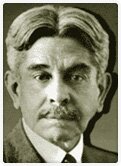


Alberto Masferrer (1868-1932) 
The humanist and writer Alberto Masferrer Salvadoran is known for works such as the minimum vital and damn money. Born July 24, 1868, in Joy, Usulután department. His father was the deputy Enrique Masferrer and Mrs Leonor Mónica. Since it was born out of wedlock, Don Alberto was the subject of prejudice and marginalization characteristic of the era.(Marginalization is the process of the destruction of civil society, which manifests itself in the disintegration of social groups, the breaking of traditional ties between people, the loss of objective belonging to one or another social community by individuals, the distortion of universal human norms and values... further on cheap-papers.com)
His childhood and adolescence were random; her father entered a boarding school in San Salvador, which fled and then was expelled from it. Then he was sent to study in Guatemala, to another facility, which also escaped. After several trips to Central America, was devoted to teaching, a profession which gave the rest of his days. Back in El Salvador, led schools and public institutions.
The country was a republic of coffee with deep social contrasts and deep injustices of all kinds. Masferrer felt called to come up with solutions, from a humanistic and non-violently, to overcome the national crisis that was brewing. One of his great contributions to national journalism was the creation in 1928 of the newspaper Patria, which released its proposals for social reform. In the pages of Fatherland issued his thought, known as “vital” (not to be confused with the “vitality” of the Spanish philosopher Jose Ortega y Gasset), in which he advocated that each person will be guaranteed the minimum conditions for a decent life. This is the core of his great book The vital minimum, which asks: “Is it even possible to insure everyone in this nation of minimum life, without which there is any failure, any human creature degenerates and bestializa? Without doubt it is, since it is constantly in the family. Every family normally attends, first, to obtain and maintain for each member the Minimum Vital: for they all are fed, trbajane, dress, living in good conditions, to acquire an elementary education, and develop a following in any standard of fairness and justice.
In 1931, the candidate for the presidency by the Labor Party, Arturo Araujo, convinced him to support him on his campaign, offering to implement, if elected, the social reform agenda in the Minimum Vital. However, the experience was disappointing for Masferrer Araujo, who was only used to meet particular political ends. In January 1932, during the Indian uprising, Masferrer had to leave the country, which seriously damaged their health. He returned to the country prey to emotional paralysis and deterioration, in the face by the national tragedy that El Salvador was living. He died on September 4, 1932.
His work includes the autobiographical prose titled Baby-sitting, with trials in which explains his social thought as new ideas, What do we do, read and write and essay on the destination, the damned money, The Minimum Vital, and the short story A life in film. Alberto Masferrer belongs to such thinkers who always advocated the peaceful and rational solutions compared to the big national crisis. His thinking has been studied in great depth by the Salvadoran essayist Matilde Elena Lopez, particularly the work Masferrer, high thinker Central America.
The mission of CEA is to increase awareness of Salvadoran Culture & History within our local & international community. CEA will accomplish the awareness by providing Cultural & Educational services in our communities, both local and international.